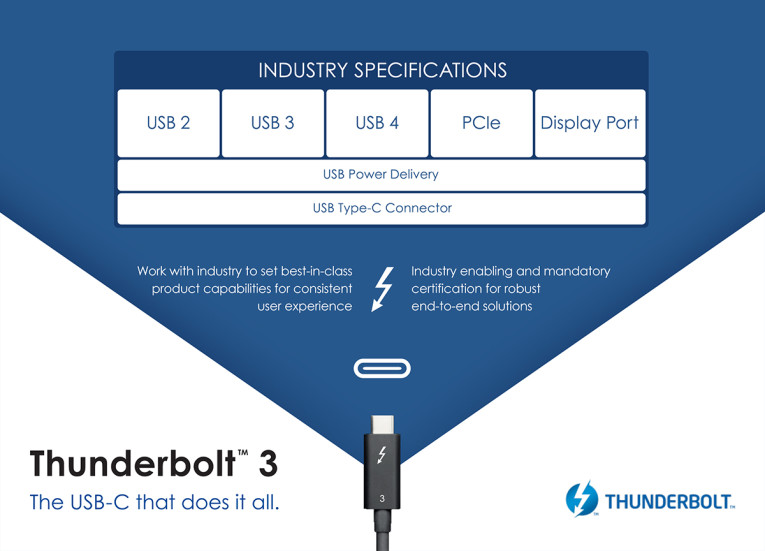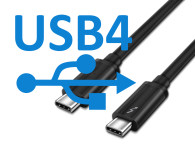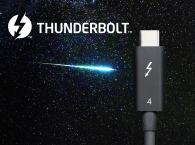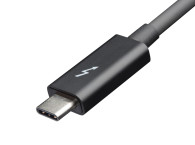
While USB 3.2 products are still not yet in the market, with controllers expected to be available only later in 2019 and the market being currently flooded with products supporting the USB Type-C connector, which might support, or not USB 3.1, and the professional market - strongly propelled by Apple - adopting Thunderbolt 3 (which uses the same Type-C connector), the USB Promoter Group apparently decided it was time to go all-in and quickly update and pair the two technologies.
While there will be consequences of this decision, namely the appearance (or not) of USB 3.2 products this year, the news that USB will be matching the 40Gbps data rates of Thunderbolt 3 might make the roadmap for all industries much clearer and effectively propel the adoption of the technology in 2020, once all the pieces fit into place. Significantly, the announcement promises to make prices for components more affordable, considering that Intel announced that it contributed the Intel Thunderbolt protocol specification to the USB Promoter Group, enabling other chip makers to build Thunderbolt compatible silicon, royalty-free.
As the USB Promoter Group states in the announcement, “USB4’s high throughput and advanced features enable new scenarios in consumer, enterprise, and intelligent edge markets, while maintaining interoperability with existing USB and Thunderbolt 3 devices.”
As the announcement details, the new USB4 architecture defines a method to share a single high-speed link with multiple end device types dynamically that best serves the transfer of data by type and application. As the USB Type-C connector has evolved into the role as the external display port of many host products, the USB4 specification provides the host the ability to optimally scale allocations for display data flow. Even as the USB4 specification introduces a new underlying protocol, compatibility with existing USB 3.2, USB 2.0 and Thunderbolt 3 hosts and devices is supported; the resulting connection scales to the best mutual capability of the devices being connected.
“The primary goal of USB is to deliver the best user experience combining data, display and power delivery over a user-friendly and robust cable and connector solution,” says Brad Saunders, USB Promoter Group Chairman. “The USB4 solution specifically tailors bus operation to further enhance this experience by optimizing the blend of data and display over a single connection and enabling the further doubling of performance.”
Key characteristics of the USB4 solution include:
- Two-lane operation using existing USB Type-C cables and up to 40 Gbps operation over 40 Gbps-certified cables
- Multiple data and display protocols to efficiently share the total available bandwidth over the bus
- Backward compatibility with USB 3.2, USB 2.0 and Thunderbolt 3
With over 50 companies actively participating in the final stages of review of the draft specification, the USB4 specification is on track to be published around the middle of 2019. Coincident with the release of the USB4 specification, the release of an updated USB Type-C Specification will be made to comprehend USB4 bus discovery, configuration and performance requirements.
The announcement also confirms that the specification update "is part of the USB performance roadmap and is specifically targeted to developers at this time. Branding and marketing guidelines will be established after the final specification is published."
More details about the initiative are available on the Intel website, where the company clearly defines it as "making the innovation delivered with Thunderbolt 3 available to everyone," by releasing the Thunderbolt protocol specification. "This, in combination with the integration of Thunderbolt 3 into upcoming Intel processors is a win-win for the industry and consumers,” says Jason Ziller, general manager, Client Connectivity Division at Intel.

As detailed at CES 2019, Intel’s upcoming 10nm processor code - named “Ice Lake” - will be the first to integrate Thunderbolt 3 and is expected to drive large-scale, mainstream adoption of Thunderbolt. This also means working closely with Microsoft to deliver built-in Windows 10 support for Thunderbolt 3 (finally), optimized for plug and play, platform power management, system charging and system wake features, like any Apple computer.
“Releasing the Thunderbolt protocol specification is a significant milestone for making today’s simplest and most versatile port available to everyone,” adds Jason Ziller, General Manager, Client Connectivity Division at Intel. “By collaborating with the USB Promoter Group, we’re opening the doors for innovation across a wide range of devices and increasing compatibility to deliver better experiences to consumers.”

“USB4’s high throughput and advanced features enable new scenarios in consumer, enterprise, and intelligent edge markets, while maintaining interoperability with existing USB and Thunderbolt 3 devices,” says Roanne Sones, Corporate Vice President, Microsoft OS Platforms. “We are excited to work with our partners in the ecosystem to bring USB4 to market and showcase its benefits.”
USB Developer Days 2019, in the second half of this year, will include detailed technical training covering the USB4 specification and the latest for USB Type-C, USB Power Delivery, and other topics like certification of computers, peripherals and cables.
The USB Promoter Group is comprised of Apple, Hewlett-Packard, Intel, Microsoft, Renesas, ST Microelectronics, and Texas Instruments and is different from the non-profit USB Implementers Forum (USB-IF), formed to provide a support organization and forum "for the advancement and adoption of USB technology as defined in the USB specifications. The USB-IF facilitates the development of high-quality compatible USB devices through its logo and compliance program, and promotes the benefits of USB and the quality of products that have passed compliance testing."
www.intel.com | www.usb.org







